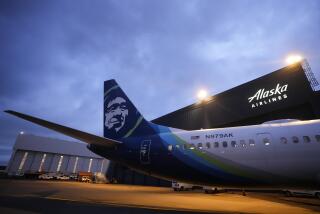19 Airliners Grounded Over Inspections
- Share via
EAGAN, Minn. — Northwest Airlines is temporarily withdrawing 19 planes from service because it cannot confirm that a required inspection had been performed on them, a company spokesman said Thursday night.
The inspections of the bulkhead part of the 19 DC9-10 and DC9-30 aircraft are required by the Federal Aviation Administration after every 50,000 landings, said William Wren, Northwest’s vice president for public relations.
But the airline told the FAA on Thursday that, after a review of its records, it could not confirm that the bulkhead inspection had been performed on the 19 planes, part of Northwest’s fleet of 312 aircraft, Wren said.
Not Related to Crash
The review was not related to the Aug. 16 crash of a Northwest jetliner at Detroit that killed 156 people, but airline executives were made aware earlier this week of a pending FAA revision to an airworthiness directive concerning the planes, he said.
The bulkhead, at the rear of the planes, is part of the aircrafts’ structure, the spokesman said.
The inspection, by special teams of mechanics at Northwest’s maintenance facilities in Minneapolis-St. Paul and Atlanta, will take 1 1/2 to 3 1/2 days for each aircraft, Wren said. All planes will be returned to service within about two weeks, he said.
Regrets Inconvenience
“We regret that this action will result in inconvenience to some of our customers,” said Steven Rothmeier, chairman and chief executive officer of NWA Inc., Northwest’s parent.
“Schedules are being adjusted to minimize that inconvenience. However, none of these aircraft will be flown in passenger service until these inspections are completed,” Rothmeier said in a statement.
Wren said he could not say how many passengers might be affected or what the extent of the scheduling changes would be.
The DC9-10 can carry 78 passengers and the DC9-30 can hold 100 passengers, he said.
More to Read
Inside the business of entertainment
The Wide Shot brings you news, analysis and insights on everything from streaming wars to production — and what it all means for the future.
You may occasionally receive promotional content from the Los Angeles Times.










